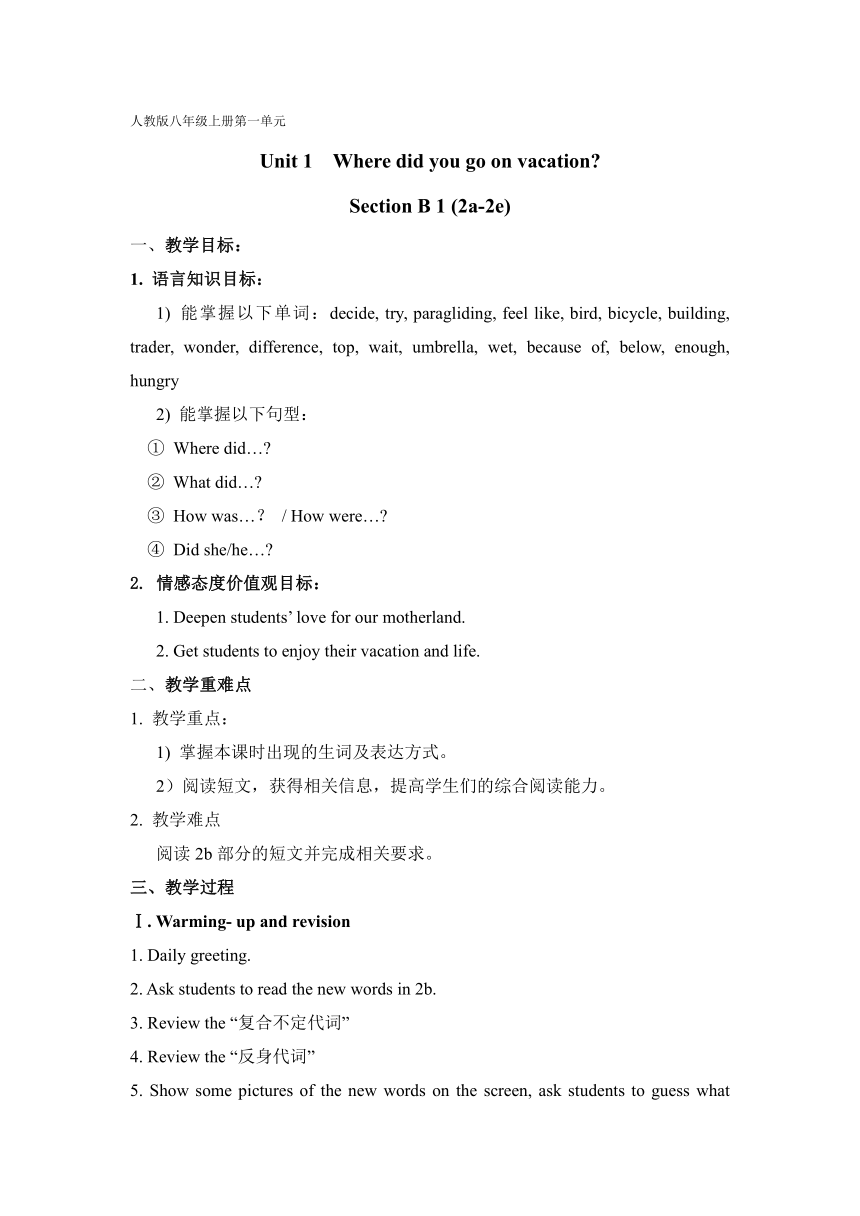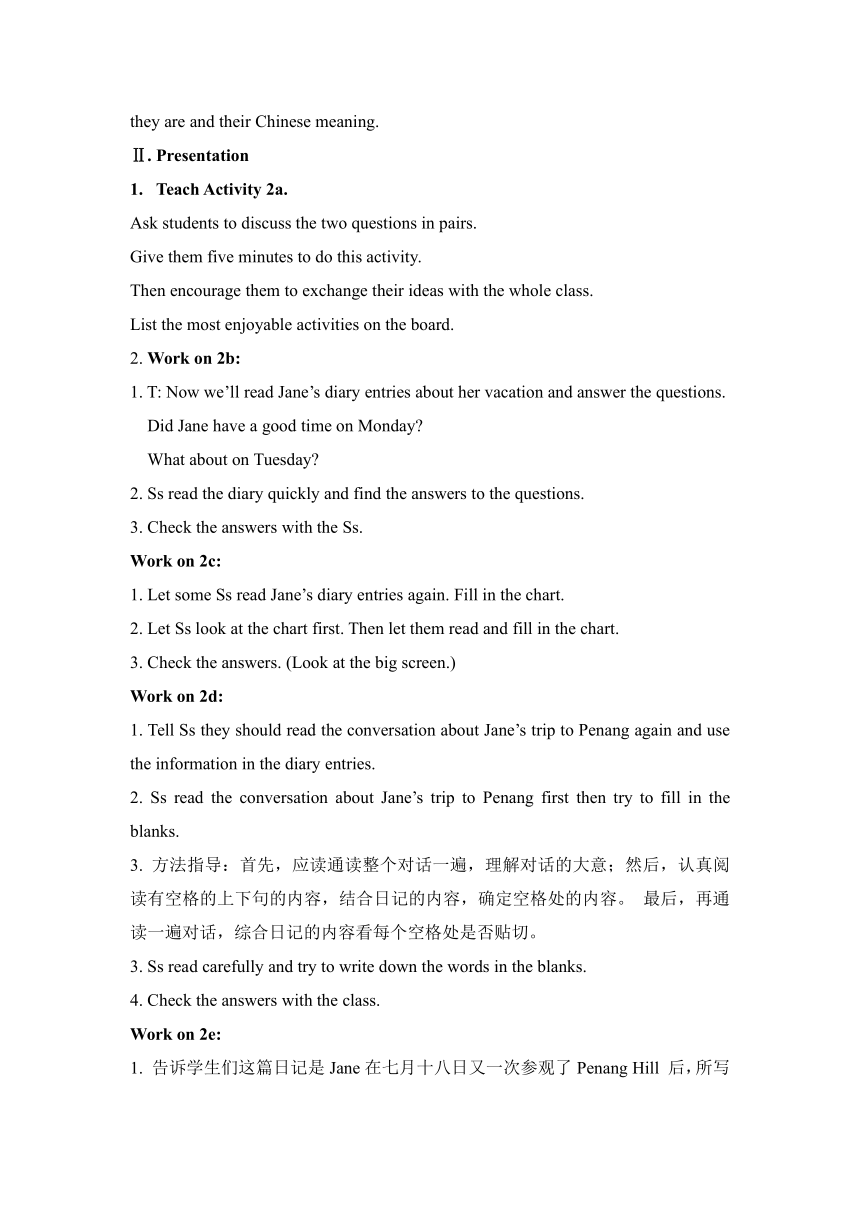人教版八年级上册Unit 1Where did you go on vacation?SectionB 2a-2e 教案
文档属性
| 名称 | 人教版八年级上册Unit 1Where did you go on vacation?SectionB 2a-2e 教案 |

|
|
| 格式 | doc | ||
| 文件大小 | 44.5KB | ||
| 资源类型 | 教案 | ||
| 版本资源 | 人教新目标(Go for it)版 | ||
| 科目 | 英语 | ||
| 更新时间 | 2022-11-06 22:55:26 | ||
图片预览


文档简介
人教版八年级上册第一单元
Unit 1 Where did you go on vacation
Section B 1 (2a-2e)
一、教学目标:
1. 语言知识目标:
1) 能掌握以下单词:decide, try, paragliding, feel like, bird, bicycle, building, trader, wonder, difference, top, wait, umbrella, wet, because of, below, enough, hungry
2) 能掌握以下句型:
① Where did…
② What did…
③ How was…? / How were…
④ Did she/he…
2. 情感态度价值观目标:
1. Deepen students’ love for our motherland.
2. Get students to enjoy their vacation and life.
二、教学重难点
1. 教学重点:
1) 掌握本课时出现的生词及表达方式。
2)阅读短文,获得相关信息,提高学生们的综合阅读能力。
2. 教学难点
阅读2b部分的短文并完成相关要求。
三、教学过程
Ⅰ. Warming- up and revision
1. Daily greeting.
2. Ask students to read the new words in 2b.
3. Review the “复合不定代词”
4. Review the “反身代词”
5. Show some pictures of the new words on the screen, ask students to guess what they are and their Chinese meaning.
Ⅱ. Presentation
1. Teach Activity 2a.
Ask students to discuss the two questions in pairs.
Give them five minutes to do this activity.
Then encourage them to exchange their ideas with the whole class.
List the most enjoyable activities on the board.
2. Work on 2b:
1. T: Now we’ll read Jane’s diary entries about her vacation and answer the questions.
Did Jane have a good time on Monday
What about on Tuesday
2. Ss read the diary quickly and find the answers to the questions.
3. Check the answers with the Ss.
Work on 2c:
1. Let some Ss read Jane’s diary entries again. Fill in the chart.
2. Let Ss look at the chart first. Then let them read and fill in the chart.
3. Check the answers. (Look at the big screen.)
Work on 2d:
1. Tell Ss they should read the conversation about Jane’s trip to Penang again and use the information in the diary entries.
2. Ss read the conversation about Jane’s trip to Penang first then try to fill in the blanks.
3. 方法指导:首先,应读通读整个对话一遍,理解对话的大意;然后,认真阅读有空格的上下句的内容,结合日记的内容,确定空格处的内容。 最后,再通读一遍对话,综合日记的内容看每个空格处是否贴切。
3. Ss read carefully and try to write down the words in the blanks.
4. Check the answers with the class.
Work on 2e:
1. 告诉学生们这篇日记是Jane在七月十八日又一次参观了Penang Hill 后,所写的。读日记,并用括号中单词的正确形式填空。
2. 方法指导:首先,再次明确这是一篇日记,因此应用一般过去时态;然后,通读一遍日记的内容,了解大体内容;最后,综合每句的内容,用括号中动词的正确的形式填空。
3. Ss read the diary and try to fill in the blanks.
4. Check the answers. (Look at the big screen)
5. 对动词一般过去时的规则形式与不规则形式,再复习一遍。
Ⅲ.Language points
1. I feel like I was a bird.
feel like+从句 意为“觉得好像是……”
e.g. I feel like I’m walking through the history.
我感觉好像是倘佯在历史的长河中。
[拓展]feel like的其他用法:
① feel like + 名词或代词意为“觉得好像”
e.g. It feels like rain soon.
感觉天好像很快就要下雨了。
② feel like + 动名词 意为“想做……”
e.g. I don’t feel like walking today.
今天我不太想去散步。
2. And because of the bad weather, we couldn’t see anything below.
because of意为“因为”,后跟名词。
e.g. They didn’t go fishing because of the bad weather.
因为天气不好所以他们没有去钓鱼。
[辨析] because 与 because of 的区别:
because + 句子 意为“因为”
e.g. 他因为生病而没有上学。
He didn’t go to school because he was ill.
He didn’t go to school because of his illness.
below 意为“在……下面,到……下面”
e.g. Please do not write below this line.
请不要写到这条线下面。
[辨析] below与under的区别:
below指某物处于较低的地方,但不一定是正下方; under指处于某物的正下方。
e.g. 我们在月下。
We are below the moon.
那名男孩子站在树下。
The boy stood under the tree.
3. My father didn’t bring enough money.
enough作形容词,意为“充足的,足够的,充分的”
e.g. You have enough time to get there on time.
你有足够的时间按时到达那里。
[注意]
当enough作副词时,意为“足够地,充足地”。它修饰形容词时应置于该形容词后面来修饰。
e.g. The house isn’t big enough for us.
这个房子对我们来说不够大。
4. …so we decided to go to the beach near our hotel.
decide v. 决定;选定
e.g. He decided to get married.
他决定结婚。
5. My sister and I tried paragliding.
try v.&n. 尝试;设法;努力
e.g. This idea seems good but you need to try it out.
这个想法似乎不错,但是需要试验一下。
After a few tries they decided to give up.
试了几次后,他们决定放弃。
6. I wonder what life was like here in the past.
wonder v. 想知道;琢磨
e.g. I wonder who she is.
我在想她到底是谁。
7. We waited over an hour for the train because there were too many people.
v. 等待;等候
e.g. She rang the bell and waited.
她按铃后就等候着。
Ⅳ.Exercise
选词填空。
1. I feel like ______ (going/go) to Hong Kong for vacation next summer vacation.
2. He’s not going to buy that car _______ (because /because of) it’s too expensive.
3. The train was late _________ (because/ because of) the heavy frog (雾).
4. Her coat reaches _____ (below/ under) her knee.
5. The boy is _________ (enough old/ old enough) to get dressed himself.
Ⅴ. 教学反思
本节课,我引领学生首先通过阅读两篇旅游日记学习了新的词汇、短语和句型,并复习了用一般过去时描述已经发生过的事情。紧接着通过补全日记的练习对本课目标语言进行了及时的巩固,在提高学生写作能力的同时,加深了他们对旅游、对生活的热爱。
Unit 1 Where did you go on vacation
Section B 1 (2a-2e)
一、教学目标:
1. 语言知识目标:
1) 能掌握以下单词:decide, try, paragliding, feel like, bird, bicycle, building, trader, wonder, difference, top, wait, umbrella, wet, because of, below, enough, hungry
2) 能掌握以下句型:
① Where did…
② What did…
③ How was…? / How were…
④ Did she/he…
2. 情感态度价值观目标:
1. Deepen students’ love for our motherland.
2. Get students to enjoy their vacation and life.
二、教学重难点
1. 教学重点:
1) 掌握本课时出现的生词及表达方式。
2)阅读短文,获得相关信息,提高学生们的综合阅读能力。
2. 教学难点
阅读2b部分的短文并完成相关要求。
三、教学过程
Ⅰ. Warming- up and revision
1. Daily greeting.
2. Ask students to read the new words in 2b.
3. Review the “复合不定代词”
4. Review the “反身代词”
5. Show some pictures of the new words on the screen, ask students to guess what they are and their Chinese meaning.
Ⅱ. Presentation
1. Teach Activity 2a.
Ask students to discuss the two questions in pairs.
Give them five minutes to do this activity.
Then encourage them to exchange their ideas with the whole class.
List the most enjoyable activities on the board.
2. Work on 2b:
1. T: Now we’ll read Jane’s diary entries about her vacation and answer the questions.
Did Jane have a good time on Monday
What about on Tuesday
2. Ss read the diary quickly and find the answers to the questions.
3. Check the answers with the Ss.
Work on 2c:
1. Let some Ss read Jane’s diary entries again. Fill in the chart.
2. Let Ss look at the chart first. Then let them read and fill in the chart.
3. Check the answers. (Look at the big screen.)
Work on 2d:
1. Tell Ss they should read the conversation about Jane’s trip to Penang again and use the information in the diary entries.
2. Ss read the conversation about Jane’s trip to Penang first then try to fill in the blanks.
3. 方法指导:首先,应读通读整个对话一遍,理解对话的大意;然后,认真阅读有空格的上下句的内容,结合日记的内容,确定空格处的内容。 最后,再通读一遍对话,综合日记的内容看每个空格处是否贴切。
3. Ss read carefully and try to write down the words in the blanks.
4. Check the answers with the class.
Work on 2e:
1. 告诉学生们这篇日记是Jane在七月十八日又一次参观了Penang Hill 后,所写的。读日记,并用括号中单词的正确形式填空。
2. 方法指导:首先,再次明确这是一篇日记,因此应用一般过去时态;然后,通读一遍日记的内容,了解大体内容;最后,综合每句的内容,用括号中动词的正确的形式填空。
3. Ss read the diary and try to fill in the blanks.
4. Check the answers. (Look at the big screen)
5. 对动词一般过去时的规则形式与不规则形式,再复习一遍。
Ⅲ.Language points
1. I feel like I was a bird.
feel like+从句 意为“觉得好像是……”
e.g. I feel like I’m walking through the history.
我感觉好像是倘佯在历史的长河中。
[拓展]feel like的其他用法:
① feel like + 名词或代词意为“觉得好像”
e.g. It feels like rain soon.
感觉天好像很快就要下雨了。
② feel like + 动名词 意为“想做……”
e.g. I don’t feel like walking today.
今天我不太想去散步。
2. And because of the bad weather, we couldn’t see anything below.
because of意为“因为”,后跟名词。
e.g. They didn’t go fishing because of the bad weather.
因为天气不好所以他们没有去钓鱼。
[辨析] because 与 because of 的区别:
because + 句子 意为“因为”
e.g. 他因为生病而没有上学。
He didn’t go to school because he was ill.
He didn’t go to school because of his illness.
below 意为“在……下面,到……下面”
e.g. Please do not write below this line.
请不要写到这条线下面。
[辨析] below与under的区别:
below指某物处于较低的地方,但不一定是正下方; under指处于某物的正下方。
e.g. 我们在月下。
We are below the moon.
那名男孩子站在树下。
The boy stood under the tree.
3. My father didn’t bring enough money.
enough作形容词,意为“充足的,足够的,充分的”
e.g. You have enough time to get there on time.
你有足够的时间按时到达那里。
[注意]
当enough作副词时,意为“足够地,充足地”。它修饰形容词时应置于该形容词后面来修饰。
e.g. The house isn’t big enough for us.
这个房子对我们来说不够大。
4. …so we decided to go to the beach near our hotel.
decide v. 决定;选定
e.g. He decided to get married.
他决定结婚。
5. My sister and I tried paragliding.
try v.&n. 尝试;设法;努力
e.g. This idea seems good but you need to try it out.
这个想法似乎不错,但是需要试验一下。
After a few tries they decided to give up.
试了几次后,他们决定放弃。
6. I wonder what life was like here in the past.
wonder v. 想知道;琢磨
e.g. I wonder who she is.
我在想她到底是谁。
7. We waited over an hour for the train because there were too many people.
v. 等待;等候
e.g. She rang the bell and waited.
她按铃后就等候着。
Ⅳ.Exercise
选词填空。
1. I feel like ______ (going/go) to Hong Kong for vacation next summer vacation.
2. He’s not going to buy that car _______ (because /because of) it’s too expensive.
3. The train was late _________ (because/ because of) the heavy frog (雾).
4. Her coat reaches _____ (below/ under) her knee.
5. The boy is _________ (enough old/ old enough) to get dressed himself.
Ⅴ. 教学反思
本节课,我引领学生首先通过阅读两篇旅游日记学习了新的词汇、短语和句型,并复习了用一般过去时描述已经发生过的事情。紧接着通过补全日记的练习对本课目标语言进行了及时的巩固,在提高学生写作能力的同时,加深了他们对旅游、对生活的热爱。
同课章节目录
- Unit 1 Where did you go on vacation?
- Section A
- Section B
- Unit 2 How often do you exercise?
- Section A
- Section B
- Unit 3 I'm more outgoing than my sister.
- Section A
- Section B
- Unit 4 What's the best movie theater?
- Section A
- Section B
- Unit 5 Do you want to watch a game show?
- Section A
- Section B
- Unit 6 I'm going to study computer science.
- Section A
- Section B
- Unit 7 Will people have robots?
- Section A
- Section B
- Unit 8 How do you make a banana milk shake?
- Section A
- Section B
- Unit 9 Can you come to my party?
- Section A
- Section B
- Unit 10 If you go to the party, you'll have a grea
- Section A
- Section B
